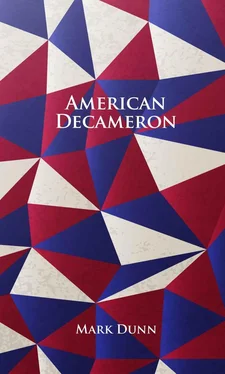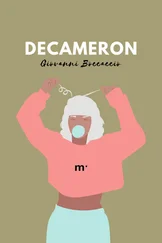“Yes to all of your questions,” said Palmer reverently and with an effusion of affection for his oldest brother that knew no bounds.
“Then we must risk our lives for them. We will do it together. Together we succeed or together we perish in that noble essay. Are we partners in this endeavor, my little brother?”
Palmer threw up. He took out his handkerchief and wiped away the bits of half-digested bread and pimento loaf that clung to his lips and chin while nodding his consent. “Let’s do this,” he said.
For the first time in almost nine years the two young men opened the front door and stepped over the threshold and out onto the front porch of their house. With a high-pitched ululation born of their great fear and with hesitant geisha-like patter-steps, they crossed the porch and descended the stairs to the front lawn. The screams of mortal terror subsided. A soft summer breeze caressed their faces. There was the smell of honeysuckle in the air, of something else floral and lovely that their gardener had planted when he wasn’t mowing their grass and trimming their hedges and running the illicit craps game that went on right under the brothers’ noses in the backyard toolshed. Hezzie knelt beside his older brother Tillman. He glanced up at Palmer. He took up Tillman’s wrist to feel for his pulse.
“He’s dead,” Hezzie said dolefully.
“I’m not dead,” snapped Tillman, his eyes still closed.
“He’s not dead,” said Hezzie, exultantly.
“I’m not dead either,” said Gail. “But I think we’ve both sustained some broken limbs, and someone in the woods who apparently doesn’t like to see people sitting on roofs has shot your brother in the shoulder.”
Palmer ran for help.
“The two of you — you did it! You have broken free of your personal Bastille!” said Tillman to Hezzie through various stabs of pain.
“By jingo we have , brother,” replied Hezzie. “Will you look at that beautiful blue sky? Can you hear the birds?”
“Is their song any different from what you might have heard through an open window inside the house?” asked Gail, who first thought it was her right leg that was broken but was now convinced that it was both of them.
“Gloriously different! Thank you, Gail. Thank you, brother.”
“For what? For falling off the roof?” asked Tillman.
“For coming here to see us. For believing that we aren’t freaks after all.”
The oldest of the three brothers kept his eyes closed. In the temporary darkness he had made for himself, he sought Gail’s twisted hand and clasped it tightly. “You know that you’ll never be completely normal, Hezzie,” he said, matter-of-factly. “It’s the family curse.”
“Yes, I know,” said Hezzie. “I have patents for forty-seven inventions that I’ve never been able to sell.”
“I’d like to take a closer look at that life preserver with the little propeller attached to it.” Tillman opened his eyes. The world was a blur, indicative of damage, he feared, to the optical nerve. “Now that you are out and about, Hezekiah, you should really sell this house and move away from Williamsport. It’s time for you and Palmer to give your lives a fresh start. Perhaps the three of us should go into business together.”
“Yes, I would like that.”
“Do you think Palmer would go for it?”
“Let’s run it up the flagpole and see if he salutes it.”
“Yes. Let’s.”
1926 BETWEEN THE hAMMER AND tHE aNVIL IN kENTUCKY
My parents divorced in 1928. Divorce was not as commonplace in that year as it would later become, especially in the small town of Winchester where we lived. Looking at my mother and father people have shaken their heads and clucked their tongues and commented in low voices about how much Mama and Daddy must have despised each other to come to this difficult decision. But I know that through the remainder of their lives (my father died in 1946 and my mother in 1962) there was never an ounce of hatred between them — only profound sadness over the fact that tragic circumstances had led inexorably to the end of their union. Each naturally blamed the other for what happened, but they must certainly have come in the end to the conclusion that they were both in part to blame — my mother for what she did and my father for not trying to understand why she did it.
It has been many years since I’ve been back to Winchester, and though it rips my heart to do so, I’d like to tell the thing that I’ve been carrying around for all these years. My name is Margaret Leach and I am an old woman with a very good memory.
In 1926 my aunt Kitty lived in Harrodsburg. She was several years younger than my mother. As far back as I could remember (I was twelve that year) Aunt Kitty had come to stay with us for several weeks in the summer. Mama was very close to her baby sister, and Daddy was fond of her as well. Kitty adored my two younger brothers and me, and I looked forward with great eagerness to each of her annual visits.
My aunt graduated from the Western Kentucky State Normal School and Teacher’s College in 1924 and got a job teaching geometry and algebra at a high school down in Harrodsburg. She would usually come for her visit in July, but in 1926, the second summer after her move, she showed up on our screened-in front porch in early June, right after school let out for summer vacation. She wore an all silk mosaic blue flat crepe dress with chenille hand embroidery, and the hat she had on was geranium red and dramatically wide brimmed (she told me she hated snug-fitting cloches — they gave her a headache). I was almost positive I’d seen Gloria Swanson wearing the very same hat in a picture that had come out just a couple of weeks earlier!
There was something very different about Kitty on this visit, which would be the last time that she would ever stay with us. She appeared older, more sophisticated than I remembered her from the previous Christmas, when we had all gathered to spend the holiday in Lexington with my grandmother. She also seemed anxious, noticeably preoccupied. Even so, she gave my brothers and me a big kiss, and she couldn’t wait to give each of us the presents she’d brought: for Mama, a big box of butter cream candy; for the boys, a mechanical train set; and for me, the best gift of all: an absolutely adorable Mayflower Pearl-on-Amber toilet set in the most beautiful sateen-lined gift box. My father (who got a “safety-first” bright red deluxe hunting cap on account of the fact that he had almost been shot during deer season the year before by a nearsighted fellow hunter) wondered aloud how a young woman like Kitty, fresh out of college and living on her own on a meager teacher’s salary, could afford such nice things for us.
Kitty just laughed. She said that the value of all the gifts hardly equaled how much it cost my father to feed and house her during her lengthy summer stays, and besides, she had made a little extra money helping a friend sell Djer-Kiss beauty products for most of the spring. Daddy remained skeptical, but Mama nodded as if the explanation had put the question to rest.
I knew that my toilet set had cost at least eight or nine dollars. I knew this because I had priced a similar set in the Sears, Roebuck catalogue.
That night, as was always the case when Kitty came to stay, I was tucked into the little trundle bed that pulled out from under the shared bed in my brothers’ room. Kitty got my room. Of course, that never stopped me from creeping back down the hall after the house had gotten quiet and right back into my own bed, where my favorite aunt and I would talk and giggle until she started feeling guilty (for denying me my “beauty sleep”). My nocturnal visits were special, and I looked forward to catching up with her that first night. But this year, circumstances wouldn’t permit it; Mama, long aware of my late-night bed-switching, forbade me. Aunt Kitty had been tired out by her trip, said Mama, and needed her rest. “And besides, Margaret, you’re getting much too old for such silliness, and your aunt simply doesn’t have the heart to tell you.”
Читать дальше












